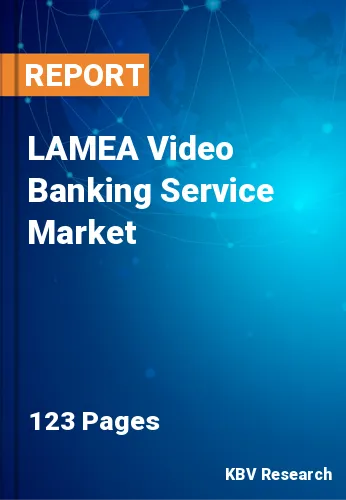The Latin America, Middle East and Africa Video Banking Service Market would witness market growth of 15.1% CAGR during the forecast period (2023-2030).
Many banks aim to provide an omnichannel experience by integrating video banking into their digital strategy. Customers can seamlessly switch between in-person branch visits, online banking, mobile apps, and video banking. In addition, video banking can be more cost-effective for financial institutions compared to maintaining physical branches. It permits them to reach a wider customer base without the expenses associated with physical locations. As with any financial service, video banking must comply with industry rules and data protection laws. This aspect is essential for institutions operating across multiple jurisdictions. Advancements in video conferencing technology, including better video quality, improved bandwidth, and the development of mobile apps, have contributed to the growth of the market. Customer feedback is important for the success of video banking services. Banks must continuously improve their platforms to ensure a user-friendly and efficient experience.
High-net-worth individuals often use video banking to access wealth management services. This includes investment portfolio reviews, asset allocation discussions, and advice on managing substantial financial assets. Video banking can bridge the gap for customers in geographically underserved areas who may not have easy access to physical bank branches.
According to IMF, banks in the Gulf Cooperation Council (GCC) countries, with strong balance sheets supported by government largesse, have been eager to expand. Fintech revenues are expected to increase from $1.5 billion in 2022 to $3.5–$4.5 billion by 2025 in the Middle East and North Africa region as fintech in the banking sector grows from less than 1 percent to 2–2.5 percent. Some Middle Eastern countries could even achieve rates equal to those of other emerging market economies, such as Brazil's 5–7 percent and Nigeria's 12–15 percent. Middle Eastern countries are increasingly interested in building an ecosystem conducive to financial innovation, with several trying to become fintech hubs, including Abu Dhabi, Bahrain, Dubai, and Riyadh. The Middle East's growing banking sector aligns with a tech-savvy approach to banking, making video banking a modern and appealing option for customer engagement. The aforementioned elements will aid in the expansion of the regional market.
The Brazil market dominated the LAMEA Video Banking Service Market, By Country in 2022, and would continue to be a dominant market till 2030; thereby, achieving a market value of $3,102.6 million by 2030. The Argentina market is showcasing a CAGR of 15.7% during (2023 - 2030). Additionally, The UAE market would register a CAGR of 14.7% during (2023 - 2030).
Based on Application, the market is segmented into Banks, Credit Union, and Others. Based on Component, the market is segmented into Solution, and Services. Based on Deployment Mode, the market is segmented into On-Premise, and Cloud. Based on countries, the market is segmented into Brazil, Argentina, UAE, Saudi Arabia, South Africa, Nigeria, and Rest of LAMEA.
Free Valuable Insights: The Worldwide Video Banking Service Market is Projected to reach USD 172.3 Billion by 2030, at a CAGR of 12.5%
The market research report covers the analysis of key stake holders of the market. Key companies profiled in the report include AU Small Finance Bank Limited, Barclays PLC, Glia Technologies, Inc., STAR Financial Bank (STAR Financial Group, Inc.), NatWest Group Plc, Guaranty Trust Bank Limited, StonehamBank, U.S. Bank, Cisco Systems, Inc., and Vidyard.
By Application
By Component
By Deployment Mode
By Country
Our team of dedicated experts can provide you with attractive expansion opportunities for your business.

